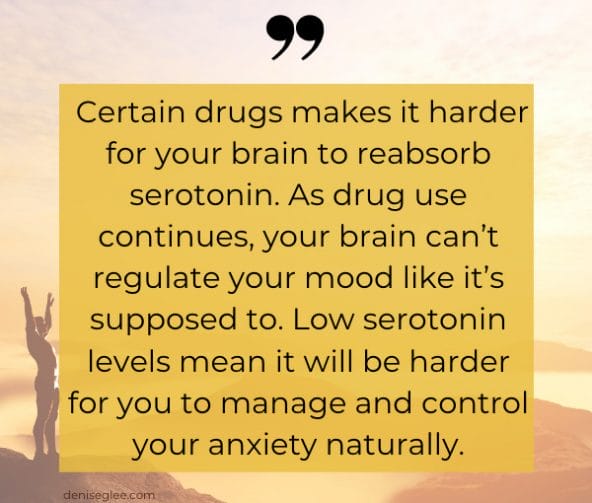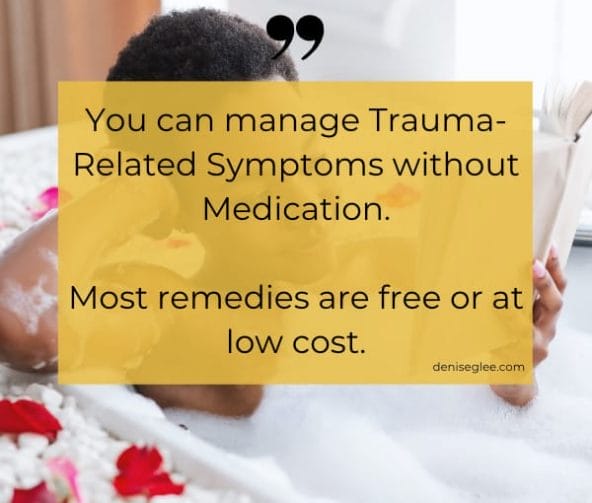
Managing Trauma-Related Symptoms Without Medication
- Published:
- Updated: April 12, 2024
Do you or someone you know suffers from the effects of a traumatic incident? The lingering effects of trauma-related symptoms include feelings of irritability, fear, paranoia, anxiety, just to name a few.
As a life coach for business owners, I want to help you deal with trauma symptoms in the safest way possible. And all the better without chemicals and their nasty side affects. That’s why in this article, we will discuss how to mange trauma-related symptoms without the use of medication.
What is trauma?
But before we discuss abandoning the use of medication, it is important to define and explain trauma. Trauma is an acute or chronic set of events where you are able to talk about the feelings but not events OR talk about the events but not feelings.
Moreover, trauma is not just limited to abuse, it includes indirect violence (e.x. watching acts of violence), chronic stress, enmeshment or neglect.
Trauma impact everyone differently, in different ways. For some people it could be as mind as a brief flashback. For others, it could launch into a full-scale panic attack.
As specialist in traumas and addictions, and who also has been diagnosed and treated with complex Post-Traumatic Stress Disorder (PTSD), I know managing trauma-related symptoms is not easy. You could be having a great day at work when an unexpected word, comment or phrase can ruin your day.
If let untreated, the pain of the unhealed emotional life will reverberate throughout all areas of your life. Unsure if you or someone you know is traumatized? If so, next we will discuss common symptoms of trauma.
Common Trauma-Related Symptoms
Trauma-related symptoms do not come in a one-size-fits-all box. Carefully review the list below. You may or may not relate to all of the common trauma-related symptoms:
- Suspicious & untrusting
- Negative & pessimistic
- Addicted to self-harm, sex, substances, work, dangerous activities, people or things
- Self-sabotaging
- Compulsive
- Scattered & distracted
- Demotivated & drained of energy
- Judgmental of yourself & others
- High pain tolerance
- Constantly apologizing
- Unable to express, recognize or process ones emotions
- Struggle with insecurities
- Hypersensitive
- Unable to be vulnerable with others – includes fear of being touched
The good news is that you can recover from trauma. There are tools and resources to help you heal from trauma-related symptoms. In this podcast episode, I talk about healing from a traumatic incident.
Now that you know that you can heal, let’s talk about options beyond medications to treat symptoms of trauma.
Why no medications to treat trauma-related symptoms?
Let’s be clear, I do not have a “take no medication, no matter what” attitude with respect to trauma-related symptoms. There is a time and place for medication, especially when the stresses of life is debilitating. However, whenever and with medical approval from a doctor, I want to steer people off their medication.
We have options besides medication to manage trauma-related symptoms. And yes, most of these remedies are free or at low cost.
Over the course of my coaching career, I have met many people who have consumed medication to treat their anxiety-related disorder. You or someone you may love taken medication like Ritalin, Adderall or Mydayis. Maybe you have have known someone who have taken Methamphetamine or Cocaine.

All the drugs listed above are all powerful stimulants which affect the central nervous system. These chemicals are designed to help you stay calm and “focused” but they impact the brain in other ways. Upon consumption of the drug, it causes the release of a serotonin, a mood-regulating neurotransmitter.
Receiving massive amount of serotonin is not a good thing. After the “high” or good feeling, these drugs makes it harder for your brain to reabsorb serotonin.
As drug use continues, your brain can’t regulate your mood like it’s supposed to. Low serotonin levels mean it will be harder for you to manage and control your anxiety naturally.
In addition, stimulants in the body may cause damage to the grey matter in the brain. The grey matter includes regions of the brain involved in muscle control, and sensory perception such as seeing and hearing, memory, emotions, speech, decision-making, and self-control. This can contribute to an overall mood dys-regulation.
The best way to treat symptoms of dis-ease and trauma are with natural methods. Here are some ways to manage the trauma without the use of medication.

Non-Medicative Ways to Treat Trauma and Anxiety
Get a Creative Hobby
Stimulating the left and right lobes of the brain is a good thing! When we engage in a create hobby like art or writing, it helps to take the mind away from worries and onto a different task.
Eat Healthy Foods
Chemicals in food, especially those that contain stimulants like sugar can spike your blood sugar and activate your limbic system (which regulates emotion). Try consuming foods that have low sugar. In addition, try to avoid eating candies and refined-carbohydrate foods like juices and corn-chips.
Eliminate Stress
Examine your life. Which parts can be simplified or eliminated? For example, can you delegate an annoying task to someone else? Can you simplify your life so that you can eliminate certain expenses?
Listen to Calm and Tranquil Music
Music is game changer. I am a big fan of spa-like music. I also like listening to soft rock music from the 70s-80s.
Find music that you like and is tranquil.
Breath Work and Meditation
There are many types of breath-work exercises. Box breaths and wave breath is one of many types.
Meditation is also very helpful. You can meditate on a variety of spiritual concepts and ideas. I like to memorize certain scriptures from the Bible.
Allow yourself to go to a different place energetically in your mind. This will help to calm the vagus nerve, which helps to regulate the para-sympathetic nervous system.
Embrace Nature
Nature is healing. Head outside at least twice a day and observe the trees, wind and all of Mother Earth’s works of wonder.
Ditch or Limit Social Media
It is not a secret that social media is addictive. Constant spikes of dopamine every time you receive a “like” is hazardous to your mental and physical health.
Exercise
I don’t have a specific recommendation. Do whatever you like to do – hike, bike, yoga, pilates. Find something you enjoy.
Change SOMETHING
Sometimes a shift a scenery can change your mental outlook. Leave the room, re-organize your workspace. Do something to distract your mind from your worries.
Ice Therapy
Apply ice directly onto your neck, wrists or desired area. The rush of cold will calm down the vagus nerve which will ultimately slow down heart your heart rate.
Calm Bracelet or Ring
Wear a symbolic object on your body like a bracelet or ring that will remind you to stay calm and relaxed.
I still feel anxious, what should I do next?
This article should be a starting point, but not the end regarding recovery from a traumatic incident. You need someone who has worked through their trauma issues and who is able to support you in the midst of your healing and restoration process. Today, consider working with an experienced trauma specialist like me.
Next, I will share my final thoughts.
Final Thoughts
Trauma-related symptoms can never be fully addressed in a single article, let alone within a website. This article is not intended replacement to the advice of a licensed and accredited health care provider that is attending to you or someone you know. I simply want you to explore all possibilities as you or someone you know learns to recover and heal from past trauma.
Dig Deeper: Listen to this episode from my podcast about non-medicative ways to treat anxiety. Click here or listen to it using the play button below.





